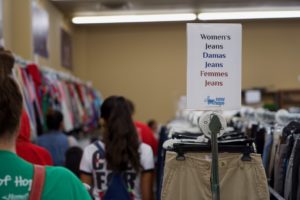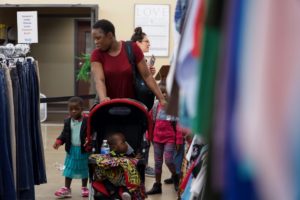Guest Post: The Day I Lost My Job
Text by Francesca “Franki” Taylor
In her book One Writer’s Beginnings, American short story writer and novelist Eudora Welty wrote: “Long before I wrote stories, I listened for stories. When their elders sit & begin, children are just waiting and hoping for a story come out, like a mouse from its hole.” The same can be said about me. I started reading at 3 years old, filling my childhood summers with twice-weekly trips to the library. Even then, I would take home as many books I could carry.
I didn’t have many friends growing up… Sometimes, I had none. So words became my allies, and learning how to join the correct words precisely was like discovering a mountain of gold. The power of words drew me toward Journalism and Communications. I don’t mean to deride teaching, health care, the law or hundreds of other noble professions. But I can’t imagine any of them giving me that inner jolt that hit me every time I wrote.
I majored in Broadcast Journalism at Texas Christian University, and after 3 internships and 2 part-time summer jobs in TV news and newspaper, I graduated and started looking for a full-time job. This will “date” my age, but when I was in university, the Internet was in its infancy and hard to access. Instead, I went to Career Services on campus and combed through entry-level job stacks, hoping one had my name on it.
The First Job
The selection was usually less than a dozen positions, and the closest one was over 3 states away. I racked my brain to figure out how I could afford fare to interviews and relocation expenses in any one of the other 49 states; I had no family or friends outside of Texas. So, in desperation, I settled for the only job I could find at $5.35 per hour. I worked there 10 years. During that time, my beloved mother suddenly died, and a plethora of personal and financial hardships sprung up year after year. I kept my eyes on the prize even as I battled through that difficult time, and landed my first job in television at a local news station about 20 years ago.
Like most first jobs in communications, it wasn’t glorious. It was part-time to start, entry level, and I needed to work two other part-time job seven days a week to survive. So I did. I slept in my car between shifts and carried a battery-powered alarm clock to make sure I was never late.
I learned a lot in that newsroom, more about people than about the industry. I’ll never forget the day when a fellow alumnus — who is an on-camera anchor — embarrassed me for no reason by bellowing loudly, “Wow, Fran, I can’t believe you’re still entry level after all these years! I thought you’d be the next Oprah by now! WHAT HAPPENED?!?!”
Her words cut like a knife. I couldn’t imagine why anyone would say something like that, much less how they could actually take pleasure in it. We had never been enemies, never competed for work. I had been stuck in my entry-level job for ten years out of college, and no one was more frustrated about that than I was. But, for whatever reason, this person felt the need to draw everyone’s attention to it. Some part of me feared that the competitive nature of this industry was guaranteed to bring out the worst in people.
The Last Job
I didn’t have to put up with her for too long, though. Nearly 12 years into my employment at that job, I was one of roughly 25 people that were laid off in the same day.
Flash forward to 2017. Another job, this time in the advertising industry. The money was nothing to brag about, but I thanked God daily that I was working steadily and had health benefits. I have always felt that it’s important to give back. This job gave me a chance to do that consistently. I continued giving to charities and even found a couple of places where I could volunteer from time-to-time.
It seemed like I had finally found a rhythm.
On August 2, 2018, I walked into the office like any other day. I was about 10 minutes early, as always, so I made a small bowl of oatmeal and a cup of coffee and started to work. My supervisor leaned over the wall of my cubicle and asked me to come into the conference room. His immediate manager was also in the room, and he held a 9 x 12 manila envelope in his hands.
Them: “Um, Fran, (blah, blah, blah) today is your last day.”
Me: “What did I do?”
Them: “We’re not going to answer any questions; you know, uh, understand this is a done deal. You’ve got 5 minutes to take as much of your belongings you can carry, give us any file drawer keys and your employee key card, and leave the premises. Good luck!”
A New Challenge
The drive home felt like an hour instead of the typical 30 minutes. My stomach churned, my arms felt like lead, my head pounded and my body felt like a million ants were stinging me from head to feet. As I opened the door to my apartment — which I had locked for the day less than an hour ago — I couldn’t figure who I should call first; my sister in Scottsdale, AZ or my brother in Arlington, TX.
I realized that I had only worked 4 days out of a typical two-week pay period, and although I had already paid my rent and made my car payment, some of my other expenses — including utilities and food — had been deferred to the upcoming paycheck. At that point, I had been eating only twice a day. It would get even leaner now.
I went to the Texas Workforce Commission to file for Unemployment Compensation and look for work. The next day I called 2-1-1 to get phone numbers of agencies that may be able to help me. One of them was 6 Stones. In the past 4 years I’ve lived in Bedford, I’d driven by the building plenty of times. I had never been inside, but a year ago I sent a donation in support of Operation Back 2 School.
Reaching Out
My heart demands that I live charitably. I’ve always felt compelled to give in support of those in need, whether it was my family, churches, organizations, or causes… usually, it was a combination. As a child, I believed, and still believe, that there is always someone out there who is having things worse than I am.
Sometimes I would roll pennies for the homeless or give my lunch money to sponsor humanitarian aid for orphans or impoverished countries. Last year, I received correspondence from an organization letting me know I’ve been contributing their cause for 29 years.
Naturally, I struggled with the idea that I would now be the one asking for help.
The New Hope Center
The next Wednesday, I walked into 6 Stones with my head down. I’ve always been able to carry my own weight and help others, but that day, I was hungry. The waiting room was full to capacity. People lined the sidewalk outside, walking with active toddlers and talking on cell phones. I took a clipboard as a kind woman asked me if I was here to get food.
I stammered out a “no ma’am,” and put the clipboard back on the desk. Then I walked outside, looked up the sky, and prayed, “Lord, these children and parents need this food a lot more than I do. I can’t take food from a hungry child or a parent trying to work with an empty stomach. I’ll find something to pawn.”
I went back into the building and told another woman that I would like to volunteer for 6 Stones. She told me to come back on Saturday at 9 a.m. I wanted to leave it there, but the volunteers wouldn’t let me run away. They made sure I took food home, even if my pride insisted that I didn’t need it. I’m glad they did.
Good and Faithful
Some people throw away more food than they can eat in 3 lifetimes. Some barely get by. Many have nothing at all. I have a heart for those who have nothing; my eldest brother died 9 years ago, homeless and hungry.
I give donations and I volunteer because I refuse to forget those who need so much and have so little. I’m fortunate to have been raised believing in My Father in Heaven. Someday, I want Him to tell me these words, found in Matthew 25:21: “'Well done, good and faithful servant. You were faithful with a few things, I will put you in charge of many things; enter into the joy of your master.”
So, for now, I am in need, but that doesn’t mean I can’t keep giving back. As far as I can see, this is the beginning of my testimony.




Francesca’s story is by far the moving, well written, and inspiring story I’ve ever read on your site or anywhere!!! I identify with the tasteless way employers are laying off today.
I Pray, please SOMEONE out there, help Francesca. Such a Giving heart she has.
We are glad to hear that you’re inspired. That’s step one!
WOW!
Francesca is truly a champion of humanity!!! Not many people are able to step outside themselves as she has. What a marvelous young woman!
We couldn’t agree more! We are glad to have her as a volunteer and contract writer.
With all the movies coming out this year about superheroes, Francesca wins my vote for a movie! As a youth, I’ve found a new hero! She fights against the villains everyone has to battle against like selfishness, meanness, cruelty, depression, and because she ends up helping others when she’s hungry and in need, yeah…she’s a SUPER hero!
Now all that’s needed is for someone to reach out and help her and prove that there are other heroes that are out there in the world besides Francesca.
Thanks for sharing the love, Amiel! Franki has our vote, too. We’re hoping that someone notices her skill and gives her a job soon!
If i can be granted one wish it would be for stockholders everywhere to read or hear of Francesca’s story and finally see what their mega selfish layoffs are doing to human lives!
Can someone out there make sure that this story gets into the hands of the decision-making individuals responsible for layoffs?
We totally understand your frustration, but we work very hard not to point fingers or cast blame on anyone. This problem is an American problem, and we all need to be part of the solution. Here’s hoping Franki’s story helps!
Here on the west coast are many college graduates living on the streets. Among the ones I’ve spoken with are some very angry and bitter victims of corporate greed. But when I read about Francesca i broke down in tears! How Francesca’s humanity and compassion raised her up above her circumstances. Especially how she broke through all the negative emotions and responses she was entitled to and reached out to help others!
May G-D Establish this lady soon…VERY VERY SOON!!!
We love the way Franki uses her heart for service to keep fighting. Thanks for your kind words; she’ll be sharing more as her story develops, and we are hoping and praying that it ends with the Joy she already has in her heart.
Hi Franki— beautiful writing and thank you for sharing your story.
Your mention about using words and finding just the right ones in just the right order resonates quite deeply with me. As does your comment about learning so much about people during you first job.
God’s abundance, joy, and love in your life that spills out and which you have to share, your humbleness, and your greater world perspective to recognize how blessed we really are even when in need. Your heart for people and your ability to “see” others and their struggles is a gift, even though it may weigh heavy at times.
We have never met, and I may be totally off-base, but having been diagnosed with ASD/Aspergers this past Oct., after having my first suspicion 3 years ago has made sense of several key areas that I have always struggled in.
Your words to your last employer, “What did I do?”, and their reply, “You know”, is a real life scenario that high to very high functioning adults on The Autism Spectrum can encounter— where those consequential encounters seemingly come out of the blue with zero warning. You obviously have a brilliant mind and a gift for communication through the use of words.
I’m finishing up my doctorate, or at least trying to, and I had experienced a certain level of success including a reputation of excellence and being highly competent and consulted of frequently by peers. However, in work situations where I saw and interacted with the same people regularly whether it was with a single boss or several authority figures, and or with colleagues I always felt a little off-sync.
The way ASD presents in women is often very different than in men. Even the diagnostic criteria for Aspergers are based on male traits and characteristics. With Aspergers the person does not have any cognitive impairments but the difficulties are surrounding verbal communication, reading non-verbal & social cues, and in relationships. For women, many are overlooked because of the male biased criteria and many practitioners not knowing and or understanding what Aspergers looks like in women. I’m 36, and when Autism Awareness hit the scenes the focus was on younger children. I was in JH/HS at that time so women my age and older, and a little younger, weren’t being evaluated nor identified.
Even today most girls don’t get discovered as having Aspergers until JH, HS, college, or even until adulthood when the social and relational expectations and demands increase, because more intricate and complex, eventually exceed the person’s capacity causing significant issues and patterns in finding and or maintaining employment, making and sustaining relationships, and or in their mental/emotional health and overall sense of well-being.
The good news is that there is available help if ASD/Aspergers is what the person is dealing with. I learned so much from reading numerous women’s blogs and for a long time was shocked and confused how their stories sounded so much like mine. YouTube and TED Talks have lots of solid info and many professional women’s own account of their journey. Tony Atwood, a first pioneer in the world of Autism and one of the first to begin noticing Aspergers, and in the past several years has been trying to get the up to date understanding of Aspergers in women into the mainstream and educating others and making available information for not only the neurodiverse population, but for those who are neurodiverse.
DARS is a great resource and can help with providing therapies that can help address the relevant areas.
Occupational therapy and speech therapy are often the most helpful as long as they have experience working with adults on the Spectrum and have training in sensory processing disorder/issues.
Their scope of practice is much wider than I originally understood it to be, but OT has been the most helpful so far, but I haven’t started speech therapy yet to compare it to.
Also, therapy with a psychologist or counselor who specializes in ASD is invaluable and who have experience working with adults with a late diagnosis. Many therapists will say they work with ASD, or this condition or that condition, but a generalist is not going to be able to help someone understand ASD and how it has and is playing out in their life provide the specific guidance and tools necessary.
Also, listen therapy such as The Listening Program, Integrated Listening Systems(iLs), and AIT by Bernard, are a few also extremely high quality and top-rated programs. I personally believe that any human could benefit from the right sound therapy program.
If anything I wrote resonates, and or if you do some research and feel like Aspergers might fit and you are interested in pursuing an assessment to rule it out or in, find a psychologist who specializes in ASD AND is very knowledgeable of how it presents in women.
Assessments can be expensive but if you have insurance most will cover it, and Medicaid/Medicare will as well.
If the above isn’t an option I’l list a few community resources that offer true sliding scales or free services: MHMR, Jewish Family Services, UNT Psychology Community Clinic, and I imagine JPS, Parkland, and MetroCare would offer ASD assessments as well.
Once diagnosed, there are charities and organizations to help cover any services not paid for by insurance. In addition, DARS/ Vocational Rehab can help provide the necessary services to help a person address the difficulties in communication and relationships, especially in the work place.
Therefore, allowing a person to find and keep employment that more closely and or is a great matches for their cognitive abilities and all the other amazing qualities as they mind the gap between the less developed social skills.
I hope this might be helpful to you, and or to at least one woman who is confused why work and or relationships seem like a big question mark. Hopefully, what I learned after enduring many practitioners, who had no clue about Aspergers let alone ASD in women, and it causing me 2.5 years of increasing frustration and confusion— hopefully by sharing my experiences and my knowledge of resources will help someone experience a breakthrough sooner and without going through the chaos, a navigating blindly the field of mental health.
1 in 4 people in the mental health system are expected to be misdiagnosed or to have only a partiality correct diagnosis. ASD/Aspergers, and it’s core characteristics usually cannot be addressed by medication. Therefore, 25% of behavioral health patients are not receiving the proper treatment.